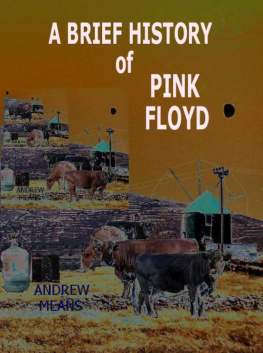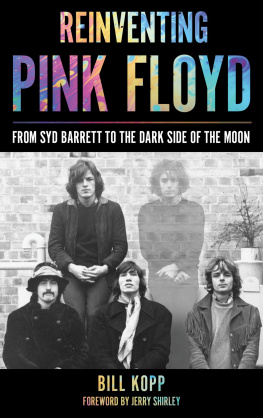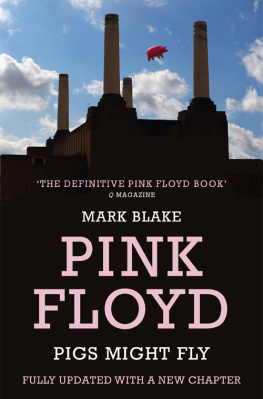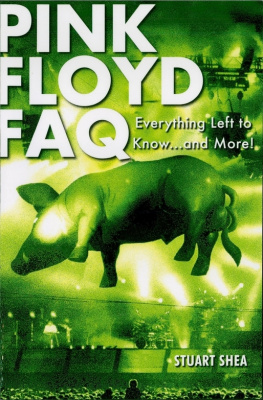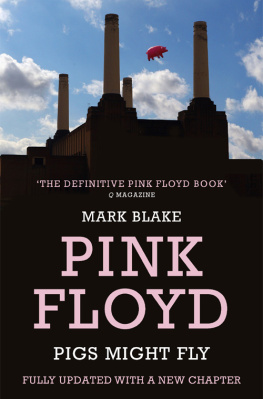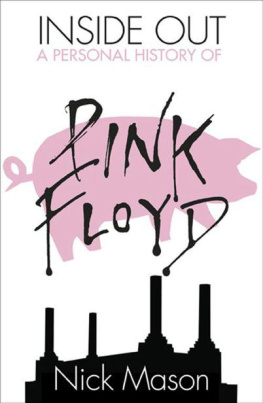
A Brief History Of PinkFloyd
By Andrew Means
Published by Andrew Means at Smashwords
Copyright 2011 Andrew L. Means
SmashwordsEdition, License Notes
This ebook islicensed for your personal enjoyment only. This ebook may not bere-sold or given away to other people. If you would like to sharethis book with another person, please purchase an additional copyfor each recipient. If youre reading this book and did notpurchase it, or it was not purchased for your use only, then pleasereturn to Smashwords.com and purchase your own copy. Thank you forrespecting the hard work of this author.
Table ofContents
New Introduction
New Introduction
To begin with, let me state upfrontthat this history is missing a chunk. Namely, the last 10 years orso.
Heres how it came about.
In the year 2000, a now defunctpublisher asked me to write a shortish biography of Pink Floyd. Itfelt like a good idea, both from a personal and a widerviewpoint.
The group had been among my favoritessince the first time I heard their breakthrough British single,See Emily Play, on radios weekly review of hits.
The timing seemed right too. By theend of the century, it appeared that the groups career had reacheda sort of lull the kind of lull that made me wonder whether therewas much more of significance to come from Pink Floyd and theirestranged bassist Roger Waters.
After all, not many 50-ishrock stars could expect to top a catalog than included phenomenalalbums like The Dark Side Of theMoon and TheWall , not to mention earlier classic songslike The Heart Of The Sun.
Where do you go after creating thatbut on to the golden oldies circuit?
All in all, I thought, not a bad timeto reflect on a bands career.
Well, time doesnt stand still, evenfor rock stars.
Keyboardist Rick Wright and thegroups original front man and inspiration, Syd Barrett, havepassed on to that great gig in the sky to borrow one of thegroups celebrated song titles. (Barrett died in 2006 and Wright in2008, of cancer.)
But Waters and guitaristDave Gilmour have continued to write and record. Gilmours outputis perhaps the most interesting, including as it does a remake ofthe groups first single, the Syd Barrett composition ArnoldLayne, and numerous collaborations, including an album in 2010entitled Metallic Spheres with the group, The Orb.
Of his solo albums, thethird 2006s On An Island has been the most successful in terms ofresponse. With Gilmours trademark Stratocaster guitaraccompaniments and distinctive vocals, its close enough to latterday Pink Floyd releases to seem like a band album in all butname.
Waters has continued to create too, intypically unpredictable fashion. Who would have expected his 2010version of the old civil rights anthem, We Shall Overcome? Rathermore predictably, his commitment to political and social causescontinues. Hes spoken out against Israeli policies towardsPalestinians as well as on the more general themes of poverty andmalaria.
Meanwhile, drummer NickMason still seems amenable to a few musical exploits when calledupon presumably as long as it doesnt interfere with otherpursuits, such as his passion for cars and racing them. One uniqueclaim he has in Floydian history however is that he is, so far, theonly member of that group to have written a book about hisexperiences. Entitled Inside Out: A Personal History of PinkFloyd , it waspublished in 2004 and has even been adapted in an audio versionwith Mason doing the reading.
Most gratifying, from their many fansperspective, is that the remaining three do still perform once in awhile sometimes even together. Considering all the bitter wordsspoken since Waters left the group, the occasional re-unions areall the more remarkable.
They buried the hatchet for the Live 8London performance in Hyde Park in 2005 the first with Waters in24 years and have come together a couple of times since,including a London gig in May 2011 as part of Waters The WallLive tour.
Apart from their concerts, news ofinterest to Pink Floyd fans continues to surface from time to time.But it tends to have little bearing on the performers creativeendeavors. Instead it detours into legal snafus or contractualupdates or repackaged/re-mixed re-releases or reminiscences orMasons work with the musicians rights organization, FeaturedArtists Coalition.
Of course that dirigiblepig from the Animals album or at least its reincarnation bobs up into the skyonce in a while in a promotional venture. And Waters rockopera The Wall isprobably good for adaptations in mediums we have yet todevise.
Still, without wishing to completelydiscount the chances of achievements to come, it seems all but acertainty that Pink Floyds great works will be seen to pre-datethe year 2000. And so, with the advent of digital publishing, Ifelt that there might be some worth in re-offering a manuscriptthat was gathering figurative dust.
Ive left it more or lessas I wrote it in 2000, except for a little editing and formatting.There continues to be a steady flow of material about the group,and to the sources I list in the acknowledgments at the end Id addthe amazingly all-encompassing Wikipedia and the incisive anddetailed retrospective magazine-style publication, Ultimate Music Guide Issue 6: Pink Floyd (fromthe makers of Uncut) . In addition, Gilmourand Waters both have personal websites adding to the stack ofFloydian information.
In retrospect, Id make a few changesif I re-wrote this. For one thing, I hope Id do a better job ofexpressing myself clearly and succinctly. For another, Id consideropting either for British or American spelling although theressomething rather appropriate about a transatlantic hybridtoo.
Perhaps I should have includedsomething about the financial troughs the band went through beforehitting pay dirt. And, to give credit where it was due but notgiven, present and past members of the band have not been without aphilanthropic spirit. Alongside his wife, writer Polly Samson,Gilmour campaigns about environmental issues and the plight of thehomeless.
Oh, and I should haveacknowledged the huge role played by the support people. Thetechnical and logistical complexity behind the group and its roadshow is staggering. The same applies to Waters enterprises,notably with The Wall . As with most major acts, the faces you see in the media areonly the tip of the iceberg.
I might also back pedal a bit on PinkFloyds image as spotlight-shunning wallflowers. Clearly they werenot without egos and the clashes that often accompanythem.
But I continue to believe that few ifany performers better illustrate the progress of rock music fromthe 60s through the turn of the century. In Pink Floyds story canbe seen the passage from the informal exploratory gatherings of the60s to the extravaganzas of more recent times, where theperformer-audience dynamics are indeed sometimes reminiscent oftotalitarian rallies of earlier decades. It was a transition thatweighed upon the mind of Roger Waters for one, and found vent inhis songs.
In retrospect though, the issue is notwhat theyve done since the year 2000, given what they did before.As Gilmour sang addressing fans with an insatiable appetite formore what do you want from me?
A few million listeners might answerthat by saying: Youve given far more than most, thank you verymuch.
Imagine the ideal credentials for atop rock group and what comes to mind?
High on the list must be charismaticpersonalities and dynamic stage presence. Headline-generatingcontroversy and flair are almost a given.
Now consider Pink Floyd. Atop rock group undeniably, with the credentials to prove it. Theiralbum The Dark Side Of The Moon became a staple in sales charts through the1980s. The Wall ,released in 1979, has become one of the best-known and best-sellingworks in rock history.
Next page
